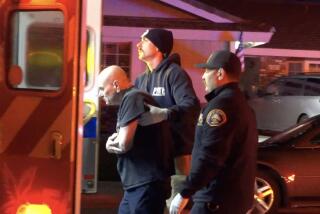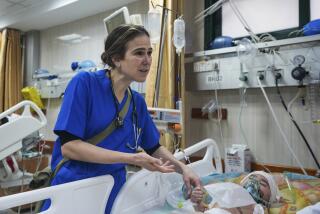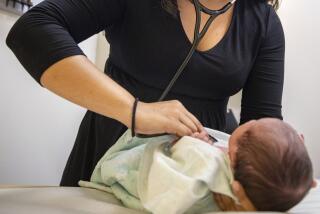State cites safety drug lapses at Cedars-Sinai
Cedars-Sinai Medical Center’s handling of high-risk drugs placed its pediatric patients in immediate jeopardy of harm, the state said Wednesday in its response to an overdose involving the newborn twins of actor Dennis Quaid.
In a 20-page report, the California Department of Public Health said the prestigious Los Angeles hospital gave the twins and another child 1,000 times the intended dosage of the blood thinner heparin Nov. 18.
“This violation involved multiple failures by the facility to adhere to established policies and procedures for safe medication use,” state inspectors wrote. “These violations caused, or were likely to cause, serious injury or death to the patients who received the wrong medication.”
In addition, the unsafe medication practices “created a risk of harm for all hospital patients,” the report said.
The public health agency has not yet decided whether to fine Cedars-Sinai for the lapses, said Kathleen Billingsley, deputy director of the state’s Center for Healthcare Quality.
Cedars-Sinai has 10 days to respond to the deficiency report but already had taken steps to ensure that patients were no longer in “immediate jeopardy,” Billingsley said.
An immediate jeopardy citation is relatively rare and indicates the severity of a hospital’s mistake.
Addressing the incident for the first time publicly, Quaid and his wife, Kimberly, said in a statement to The Times that they felt “relieved” to know more about what happened to their children. They also criticized Cedars-Sinai for what they characterized as a lack of candor about what happened.
The Quaids said senior hospital officials told them that their children received only one overdose of heparin, but the state report cited two instances.
“We find it outrageous and totally unacceptable that we are learning for the first time, along with anyone else who reads the newspaper, exactly what transpired,” the Quaids said.
In a written statement, Dr. Michael L. Langberg, Cedars-Sinai’s chief medical officer, said the state report confirmed the hospital’s internal findings, which identified at least three separate safety lapses that led to the overdoses.
“While this is a rare event, we are pleased that the [state health department] shares our view that it is an important opportunity for the entire institution to explore any and all ways we can further improve medication safety,” Langberg said.
Following the incident, the hospital took steps to retrain staff, fully segregate high-concentration heparin, and review all policies and practices involving high-risk medications.
Among the errors cited by the state: Nurses and pharmacy technicians did not check product labels before they dispensed heparin and did not keep adequate records of when it was used. The hospital also did not take steps to implement its own policies on high-risk medications.
Quaid’s children were born Nov. 8 in Santa Monica to a gestational surrogate; the Quaids are the biological parents. The children were taken to Cedars-Sinai within days for the treatment of an infection.
The lapses began the morning of Nov. 18 when two pharmacy technicians mistakenly delivered 100 vials of heparin to the pediatric unit. The vials contained a concentration of 10,000 units per milliliter instead of the appropriate 10 units per milliliter of the blood thinner, which is used to prevent clots.
A short time later, the Quaid twins, Zoe Grace and Thomas Boone, received their first dose of the high-concentration heparin to flush their intravenous lines. The twins received a second dose about eight hours later. Some of the administrations were not documented in their medical records. The nurses involved told inspectors that they could not remember whether they had read the label on heparin vials.
In the evening, a doctor was told that both children were oozing blood from the site of their intravenous lines and from their heels, where they had had blood drawn. The overdose was identified and both received two doses of protamine, an antidote to reverse the effects of heparin.
The Quaid twins were released from the hospital by early December. The third child was released a day after receiving the heparin overdose and did not require the antidote.
More to Read
Start your day right
Sign up for Essential California for news, features and recommendations from the L.A. Times and beyond in your inbox six days a week.
You may occasionally receive promotional content from the Los Angeles Times.





